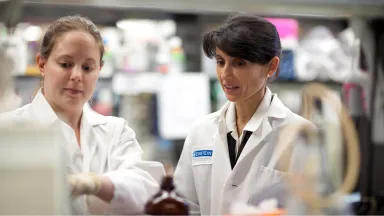
Chaoyuan Kuang, M.D., Ph.D.
- Assistant Professor, Department of Oncology (Medical Oncology)
- Assistant Professor, Department of Medicine (Oncology & Hematology)
- Assistant Professor, Department of Molecular Pharmacology
Area of research
- Preclinical and translational research of colorectal and other GI cancers, patient-derived organoids, targeted therapy, immunotherapy, clinical trials
Location
- Albert Einstein College of Medicine Jack and Pearl Resnick Campus 1300 Morris Park Avenue Chanin Building 628 Bronx, NY 10461
Research Profiles
Professional Interests
Our lab studies biology and therapies for colorectal cancer. We use unique, patient-derived models of cancer in lab, and a combination of dry-lab and wet-lab approaches. Our techniques can be applied to mechanistic discovery as well as therapeutic validation of drugs. Ultimately, we hope to translate our findings into novel clinical trials.
Inhibition of CDK9 for the treatment of CRC: We have confirmed that novel small molecular inhibitors of Cyclin-dependent kinase 9 (CDK9) can potently inhibit CRC in our lab models. Our mechanistic work suggests that indirect suppression of EGFR/MAPK signaling is a major part of CDK9 inhibitor activity. Based on this finding, we hypothesized that inhibitors of the MAPK signaling pathway could be combined with CDK9 inhibitors to synergistically treat CRC. As proof-of-concept, we found that the BRAF inhibitor encorafenib indeed synergizes with CDK9 inhibitors to suppress CRC growth in vitro and in vivo. We are working to expand this project into other areas of MAPK targeting, as well as translate our findings clinically.
Development of novel patient derived models for drug discovery: Preclinical discovery and validation of cancer drugs is typically conducted using well-established cancer cell lines and xenograft models. These models are often monocultures devoid of clinically important features such as intra-tumoral heterogeneity and microenvironment. Further, the majority of established cancer models are derived from a homogeneous segment of the U.S. population. We are collecting cancer specimens from our diverse patients in the Montefiore Einstein Comprehensive Cancer Center to establish novel preclinical cancer models that will be used for cancer drug experiments. We will combine this biobank with rigorous molecular and clinical annotation to facilitate personalized drug discovery. To further extend our modeling capabilities, we are currently establishing more complex, co-culture models, in which non-carcinoma cells from the tumor microenvironment are cultured simultaneously with the carcinoma cells.
Selected Publications
Chaoyuan Kuang, Ning Wei, Mahshid Mohammadi, Muzaffer A. Bhat, Terence Li, Priyanka Patil, Othon Wiltz, Renee Huang, Kohtaro Ooka, Melanie Quintal, Edward Chu. CDK9 inhibitors modulate the transcriptional landscape of colorectal cancer to suppress MAPK signaling and synergizes with BRAF inhibitors to treat BRAF-mutant colorectal cancer [abstract]. In: Proceedings of the American Association for Cancer Research Annual Meeting 2024; Part 1 (Regular Abstracts); 2024 Apr 5-10; San Diego, CA. Philadelphia (PA): AACR; Cancer Res 2024;84(6_Suppl):Abstract nr 1218.
Bteich F, Mohammadi M, Li T, Bhat MA, Sofianidi A, Wei N, Kuang C. Targeting KRAS in Colorectal Cancer: A Bench to Bedside Review. Int J Mol Sci. 2023 Jul 27;24(15):12030. doi: 10.3390/ijms241512030. PMID: 37569406; PMCID: PMC10418782.
Kuang C, Tong J, Ermine K, Cai M, Dai F, Hao S, Giles F, Huang Y, Yu J, Zhang L. Dual inhibition of BET and HAT/p300 suppresses colorectal cancer via DR5- and p53/PUMA-mediated cell death. Front Oncol. 2022 Oct 12;12:1018775. doi: 10.3389/fonc.2022.1018775. PMID: 36313707; PMCID: PMC9599411.
Kuang C, Park Y, Augustin RC, Lin Y, Hartman DJ, Seigh L, Pai RK, Sun W, Bahary N, Ohr J, Rhee JC, Marks SM, Beasley HS, Shuai Y, Herman JG, Zarour HM, Chu E, Lee JJ, Krishnamurthy A. Pembrolizumab plus azacitidine in patients with chemotherapy refractory metastatic colorectal cancer: a single-arm phase 2 trial and correlative biomarker analysis. Clin Epigenetics. 2022 Jan 6;14(1):3. doi: 10.1186/s13148-021-01226-y. PMID: 34991708; PMCID: PMC8740438.





